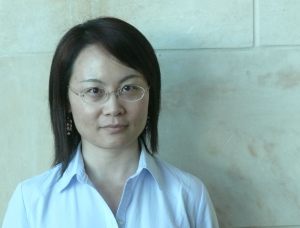On Friday, September 11, the Otto Lehmann Foundation, together with KIT, will hand over the Otto Lehmann Award in the amount of EUR 5000. This year, the award will be granted for the 11th time and go to the Chinese Ying Zhou for her excellent work in the field of liquid crystals. The young scientist convinced the jury with her dissertation on the simulation of photonic liquid crystal lasers used in optical telecommunications, which was submitted to the College of Optics and Photonics of the University of Central Florida.
The award will be handed over to Zhou on Friday, September 11, at the Dürersaal of the Gastdozentenhaus on the southern KIT campus, Engesserstraße 3, at 11:30 hrs. Journalists are cordially invited.
In her dissertation “Cholestric Liquid Crystal Photonic Crystal Lasers and Photonic Devices“, the Chinese researcher simulated liquid crystal-based photonic lasers. This laser technology is applied in optical telecommunications, for instance, in high-speed glass fiber cables. Another application covers so-called solid-state lasers for precise materials processing in industry. With her new simulation results, Zhou demonstrated that the efficiency of such photonic lasers can be increased significantly. In this way, the researcher made a major contribution to the scientific and technical development of liquid crystals according to the jury.
Although she still is quite young, the laureate has made a number of publications in physical journals, for which she is working as a scientific reviewer today. For her research work presented at numerous international symposiums, she was granted several awards, for example the New Focus / Bookham Award of the Optical Society of America (2007). Her studies of optical engineering at the Chinese Zhejiang University were followed by a second master degree at the College of Optics and Photonics of the University of Central Florida, Orlando, where she made her Ph. D. with distinction in 2008.
Liquid Crystal Pioneer Otto Lehmann
With its award for young scientists, the foundation commemorates its eponym, the scientist Otto Lehmann, full professor of physics at the Fridericiana from 1889 to 1922. Lehmann accomplished pioneer work in the research of liquid crystals, for which he received international recognition. Moreover, Lehmann developed the crystallization microscope and, thus, contributed decisively to the progress of scientific microscopy. Today, liquid crystal displays are components of our electronic everyday life. Flat screen technology, for instance, is used in laptops, navigation systems, and modern TV sets.
Professors Dieter Mlynski and Peter Knoll from the Institute for Theoretical Electrical Engineering and Systems Optimization (ITE) of Universität Karlsruhe founded the Otto Lehmann Foundation in August 1997 together with the then active University President, Professor Sigmar Wittig, and other co-founders.

Otto Lehmann (1855-1922)
Foto: Universitätsarchiv Karlsruhe
The Program of the Award Ceremony:
Welcome and Presentation of the Laureate
Prof. Dr. Norbert Henze
Vice President of Universität Karlsruhe (TH)
Presentation of the Otto Lehmann Foundation
Prof. Dr. Ing. Peter M. Knoll,
Director of the Otto Lehmann Foundation
Hand-over of the Award
Short Presentation by the Laureate
Ying Zhou, Ph.D.
College of Optics and Photonics/CREOL
University of Central Florida
“Cholestric Liquid Crystal Photonic
Crystal Lasers and Photonic Devices“
Being “The Research University in the Helmholtz Association”, KIT creates and imparts knowledge for the society and the environment. It is the objective to make significant contributions to the global challenges in the fields of energy, mobility, and information. For this, about 10,000 employees cooperate in a broad range of disciplines in natural sciences, engineering sciences, economics, and the humanities and social sciences. KIT prepares its 22,800 students for responsible tasks in society, industry, and science by offering research-based study programs. Innovation efforts at KIT build a bridge between important scientific findings and their application for the benefit of society, economic prosperity, and the preservation of our natural basis of life. KIT is one of the German universities of excellence.

